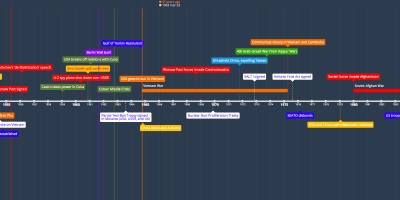13 out 1962 ano - Cuban Missile Crisis
Descrição:
P: Most important: US role in Cuba and the Cuban revolution/establishment of Castro's regime (underlying)E: US Role in Cuba
E: The United States supported Batista, the previous leader of Cuba before Castro's revolution and considered the island of Cuba to be within its sphere of influence. As they viewed Cuba's assets as their own they opposed the nationalisation of Cuban industry which was to occur during Castro's revolution and it was determined that any Cuban government could reflect and protect US interests. The United States had an agreement with Cuba allowing it to establish a naval base at Guantanamo and the Platt amendment of 1901 stated the us would " exercise the right to intervene for the preservation of Cuban independence".
E: Cuban revolution/establishment of Castro's regime
E: On the 8th of January the United States reluctantly recognized the legitimacy of Castro's government, realising that Batista had lost the support of most Cubans. The United States still hoped to control events in Cuba through its economic interests and the presence of a pro-US middle class. Castro insisted he was not a communist and in April 1959, Castro visited the United States in the hopes of financial aid for the reforms he believed Cuba needed, including the nationalisation of Cuban industry. The government attempted to moderate Castro's reforms by withholding economic assistance unless he followed strict guidelines. This angered Castro and caused him to turn to the Soviet Union for aid.
P: Military provocation: Berlin crisis, US missiles in Turkey, Khrushchev moves missiles into Cuba
E: Berlin Crisis
E: an added dimension to the Cuban Missile Crisis was that Kennedy believed Khrushchev's actions were part of a plan to pressure the USA to leave berlin. Kennedy believed the USA still had to worry about Berlin in addition to Cuba and this further increased tensions as Kennedy felt his actions would affect the world and not just Cuba.
E: US missiles in Turkey
E: As the United States had missiles in Turkey Khrushchev argued that it was only fair for the Soviet Union to move their missiles into Cuba.
E: Khrushchev moves missiles into Cuba
E: Khrushchev wanted a propaganda advantage and bargaining chip in Cuba, this led to the movement of Soviet nuclear arms to Cuba. Historian Robert begs argues Khrushchev's main reason was the bargaining power he would gain whereas historian John Lewis Gaddis argues this was because he feared another attempt to invade Cuba. This viewpoint is supported by Soviet historians who believe that Khrushchev was primarily concerned with preserving revolutionary Cuba
P: US responses to Castro's regime and the Cuban revolution
E: bay of pigs
E: The bay of pigs was an invasion attempt organised by the US with an invasion force of Cuban exiles. However, tis ended in complete failure and humiliation with 1214 of the 1400 invaders being captured and only returned for $53 million worth of food and machines from the United States. As a result of failure Kennedy lost prestige both domestically and overseas and this set back attempts to identify the USA with anti-colonialism. This also gave the Soviet Union further ammunition to use when criticising the United States. The failure of the invasion strengthened Cuba's ties with the USSR and Castro declared himself a Marxist-Leninist, making a defence alliance with the Soviet Union. The effects of the failure at the Bay of Pigs were disastrous for the United States and massively increased superpower tensions in Cuba, as well as bringing Cuba and the Soviets into closer alliance.
E: US response to Castro's regime/ Soviet aid
E: the US viewed Castro turning to the Soviet Union as threatening and thus responded. The US responded militarily by organising an invasion force of Cuban exiles to overthrow Castro and economically by proclaiming an embargo on all exports to Cuba except for food stuffs and medicines. Both of these plans failed horrifically and as a result Castro grew more strongly linked to the Soviet Union.
Adicionado na linha do tempo:
Data:
13 out 1962 ano
Agora
~ 63 years ago
